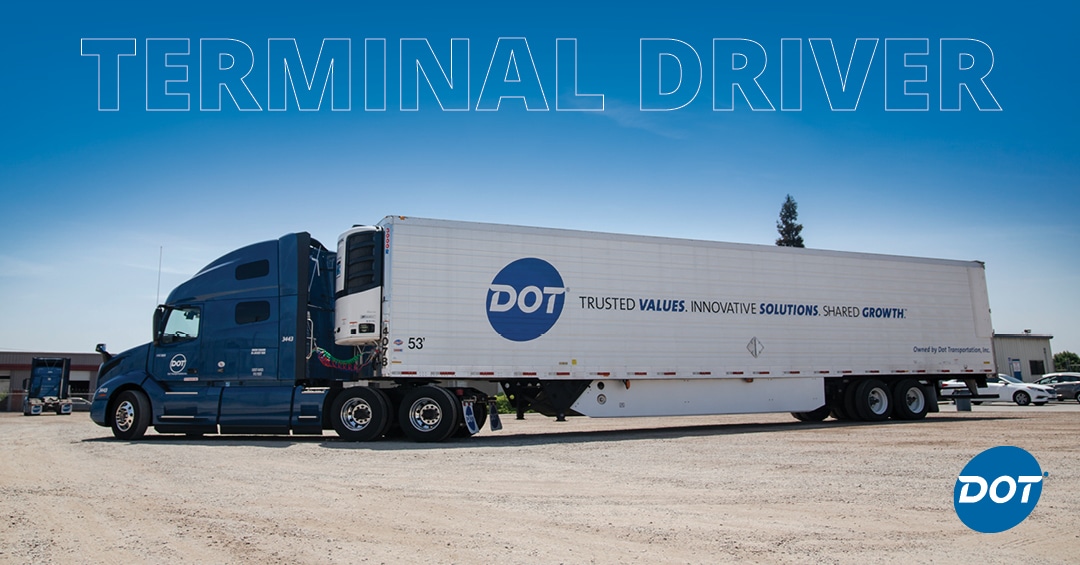If a trucking company says they have a “terminal,” that can be confusing because “terminal” means different things to different companies. It can mean one thing to one driver and something totally different to another because of their different trucking career experience. Even doing a Google search for “What does it mean to be a terminal driver?” doesn’t come up with very good results.
So, we wanted to take some time to explain what a terminal means for the industry as a whole and what it means for Dot Transportation, Inc. (DTI).
What is a terminal?
For many trucking companies, a terminal is “merely a place of business for a trucking company. It’s where their offices are, [where] maintenance mechanics/repair shops are typically located.”
For DTI, a terminal is a “piece of land or a parking lot—occasionally with a brick and mortar building—where Dot drivers can rendezvous and swap trailers.” Each Dot terminal falls under the umbrella of one of our 12 distribution centers (DC), which means drivers will still have access to the excellent in-house resources we have available, such as the Dot garage, occupational health trainers, and physical therapists.
Why are terminals important to the supply chain?
Without a doubt, all professional truck drivers play an important part in moving product through the supply chain. But, for many trucking companies—including DTI—terminal drivers play an essential role in the connectivity of the supply chain. What does that mean? Let’s break it down.
Truck drivers move 72% of all freight tonnage in the U.S., according to Bob Costello, Chief Economist & Sr. VP of International Trade Policy & Cross-Border Operations at the American Trucking Association. At DTI, in order to move that freight as effectively and efficiently as possible, we have set up 30+ terminal locations across the country in addition to our 12 DCs to act as connection and transfer facilities. This way, Dot’s dispatch team can route the loads in the direction of a terminal and DTI drivers can transfer truckloads of product to other DTI drivers at the terminal. This prevents cross-country trips and helps get our drivers home weekly.
How do terminals help Dot move product?
They add Dot locations closer to our business partners
Dot Foods has customers in every nook, crannie, and corner of the United States. We have some customers in Canada, too! But we can’t put DCs in every location that would be logistically optimal for serving our customers. That’s where terminals come in. When we add a terminal to the map, it helps us better serve our customers and hire even more drivers from all areas of the country.
They help us get our drivers home weekly
Terminals help us keep our promise of weekly home time to DTI drivers. By having more terminal locations where drivers can drop and hook, we don’t need our drivers to drive over-the-road (OTR) across the country to deliver products. Terminals also allow us to offer a wider variety of schedule options, such as the 4×4 or the 6×3, so we can make sure we have jobs available that fit your lifestyle.
They help us grow the DTI fleet
In order to hire more drivers, we have to have more jobs available than just in our 12 DC markets. Having terminal locations makes it possible for DTI to offer dozens of more driving jobs and add more drivers to the Dot Transportation team!
What does being a terminal driver with DTI mean for you?
Differences Between a Terminal & DC Driver
Overall, there are not a huge number of differences between being a DC driver for DTI and being a terminal driver. But, there are a few key differences:
- It is expected that terminal drivers take more personal responsibility for the location since the team is smaller at that location.
- DTI terminals tend to be located in more urban and suburban areas, whereas our DCs are located in more rural areas.
- There is no gate station at DTI’s terminal locations.
- You will have regular phone communication with DTI leadership and managers versus face-to-face interactions.
- Regular truck maintenance will be scheduled for whenever you will be at a Dot DC so it can be completed by Dot’s in-house garage team.
- You’ll develop a tight-knit relationship with your terminal cohort of drivers.
Overall Benefits of Driving for DTI
Outside of they key differences, you still receive the same benefits as any other DC driver, such as:
- Weekly home time
- Variety of schedule options
- No-touch or delivery driver type options
- Dot driver training and orientation at your umbrella / home DC
- Regular communication and support from other Dot drivers, dispatch, and DTI leadership
- Competitive, activity-based pay
- Best-in-class benefits to keep you and your family covered
Ready to Join the DTI Terminal Team?
Explore Available Terminal Jobs
